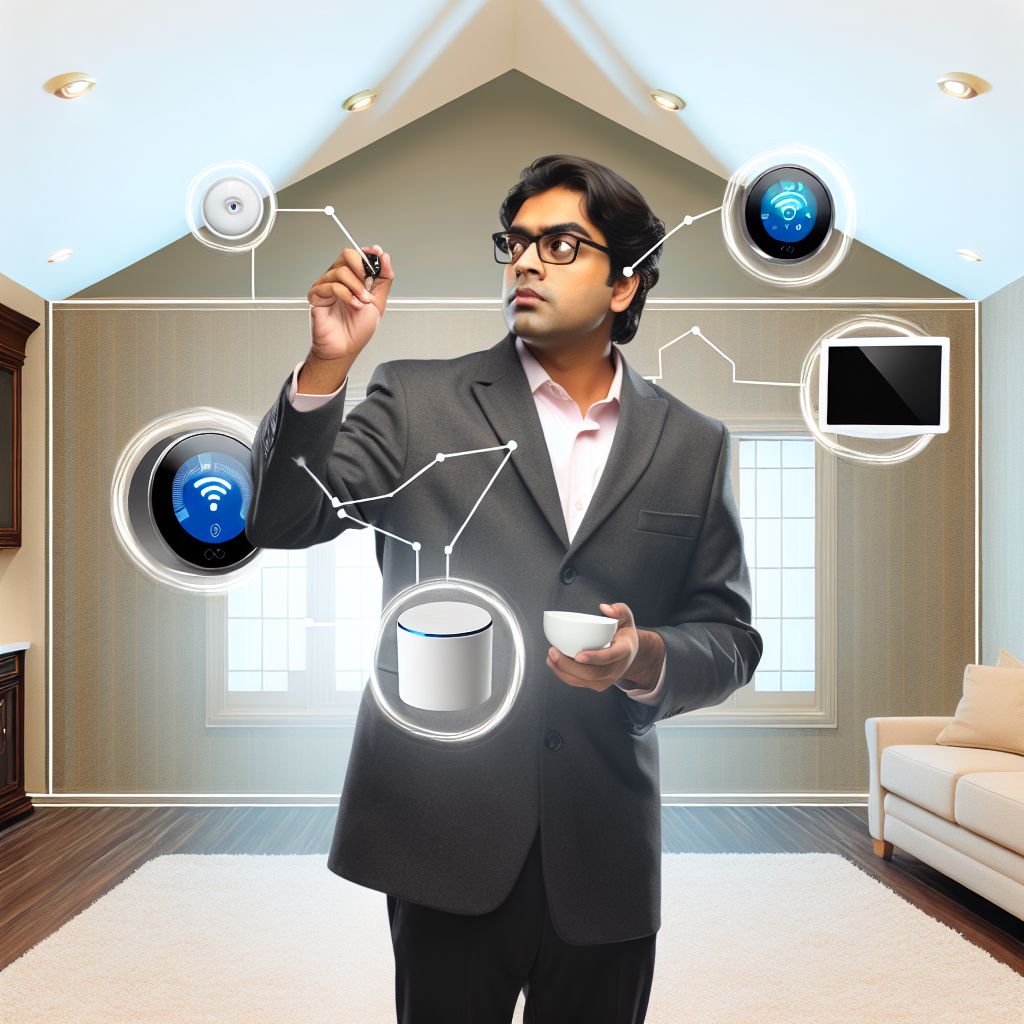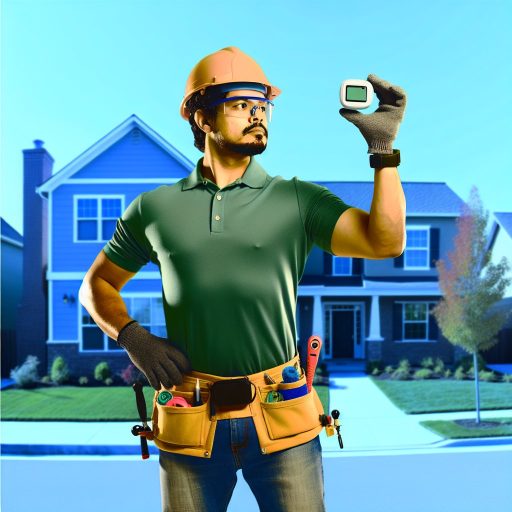Introduction to IoT Home Automation
IoT home automation reshapes the way we manage residential properties.
This technology utilizes internet-connected devices for seamless control.
For real estate investors, IoT home automation provides significant advantages.
It enhances property value and attractiveness to tenants.
Investors can benefit from increased rental income through smart features.
Understanding the Importance for Real Estate Investors
Home automation systems improve energy efficiency across properties.
They integrate smart thermostats, lighting, and security systems.
Such upgrades lead to reduced utility costs for both owners and tenants.
Market Trends and Demand
The demand for smart homes continues to grow rapidly.
Many renters express a strong preference for automation features.
Investors who adapt to this trend can attract a larger tenant pool.
Operational Efficiency Benefits
IoT devices streamline property management tasks significantly.
Automated systems enable remote monitoring and control of features.
This efficiency reduces the need for frequent site visits.
Enhanced Security Through Smart Systems
Smart security systems enhance safety for residents.
Investors can install cameras, motion sensors, and smart locks.
Such features provide peace of mind and increased tenant satisfaction.
Overview of IoT Technologies Used in Home Automation
Internet of Things (IoT) technology revolutionizes home automation.
It connects devices and systems for seamless operation and control.
Residential real estate investors can greatly benefit from these advancements.
Smart Devices
Smart devices serve as the foundation of IoT home automation.
They include smart lights, thermostats, and locks.
These devices can be controlled remotely via smartphones or tablets.
Furthermore, they can learn user preferences for increased convenience.
Home Automation Hubs
Automation hubs play a critical role in managing smart devices.
They act as central control points for various system integrations.
For instance, hubs can connect lighting, security, and thermostat systems.
Additionally, they enable voice control through devices like Amazon Alexa or Google Home.
Communication Protocols
Protocols dictate how devices communicate within a smart home ecosystem.
Common protocols include Wi-Fi, Zigbee, and Z-Wave.
Wi-Fi offers high-speed connectivity but can consume more energy.
On the other hand, Zigbee and Z-Wave provide energy-efficient solutions.
Investing in compatible protocols ensures long-term device interoperability.
Security Systems
IoT enhances security systems in smart homes.
Smart cameras, door sensors, and alarms integrate with home automation.
These systems can send real-time alerts to homeowners or property managers.
Moreover, they allow remote monitoring for enhanced peace of mind.
Energy Management
Energy management plays a significant role in smart home technology.
IoT devices help optimize energy consumption in real estate investments.
Smart thermostats adjust temperatures based on the homeowner’s schedule.
Consequently, this leads to substantial savings on energy bills.
Applications of Data Analytics in Property Management
Data analytics allows investors to make informed decisions.
IoT devices gather valuable data about energy usage and security alerts.
Analytical insights can guide property improvements and renovations.
Using these insights, investors can optimize their property management strategies.
Benefits of Implementing IoT Home Automation in Rental Properties
Increased Operational Efficiency
IoT home automation streamlines property management tasks.
It allows landlords to monitor systems remotely.
Consequently, property managers save time on routine checks.
This efficiency leads to faster issue resolution.
Moreover, automated systems often report problems immediately.
Enhanced Tenant Experience
Smart home features create a modern living experience.
IoT technologies boost comfort and convenience for tenants.
For instance, tenants can control lighting via smartphone apps.
This flexibility helps tenants feel more at home.
Additionally, enhanced security options improve peace of mind.
Cost Savings
Implementing IoT systems can reduce utility costs.
Smart thermostats optimize energy usage without sacrificing comfort.
Additionally, automated water systems can detect leaks promptly.
This proactive approach prevents costly repairs in the future.
Overall, landlords enjoy lower operating expenses due to IoT technology.
Increased Property Value
IoT home automation features boost property appeal.
Properties equipped with smart technologies attract higher rent.
Prospective tenants often prioritize modern amenities.
As a result, investors can increase their returns significantly.
Furthermore, homes with IoT are more desirable in the market.
Better Data Insights
IoT devices collect valuable data on tenant behavior.
This data helps landlords understand usage patterns.
Armed with this information, they can make informed decisions.
Ultimately, this insight supports strategic property improvements.
Additionally, effective data analysis can optimize rental pricing.
See Related Content: Landing Pages for Real Estate Agents to Convert More Leads Into Clients
Cost Analysis
Initial Investment
Investing in IoT home automation technology requires significant initial capital.
These systems include smart thermostats, security cameras, and automated lighting.
For instance, a comprehensive system for a rental property can cost upwards of $5,000.
However, owners often overlook long-term benefits associated with these technologies.
It’s crucial to analyze the return on investment over time.
Long-Term Savings
IoT technologies lead to significant savings on property management costs.
Automated systems can reduce energy bills by optimizing consumption based on usage patterns.
Landlords have reported energy savings of up to 20 percent.
Additionally, these smart systems enhance tenant satisfaction, resulting in lower vacancy rates.
Reducing tenant turnover directly saves on operations and marketing expenses.
Operational Efficiency
Home automation improves overall operational efficiency for property managers.
Remote monitoring enables proactive maintenance, reducing emergency repair costs.
Integrating systems streamlines communication and minimizes manual tasks.
This efficiency allows property managers to focus on higher-value responsibilities.
Strategic Benefits of IoT Adoption in Real Estate
Ultimately, the initial investment in IoT home automation pays dividends.
Investors should evaluate potential long-term savings against upfront costs.
With careful planning, real estate investors can significantly enhance their property profitability.
Moreover, adopting these technologies increasingly attracts modern tenants.
As a result, properties will maintain competitive advantages in the evolving market.
Uncover the Details: Virtual Reality for Real Estate Developers and Architects
Key IoT Devices for Home Automation
Smart Thermostats
Smart thermostats revolutionize how we control heating and cooling.
These devices learn user preferences and adjust accordingly.
They also enable remote management via smartphone apps.
Energy efficiency is a major benefit of using smart thermostats.
Homeowners can significantly reduce energy bills over time.
For investors, this translates into increased property value.
Security Systems
Modern security systems ensure peace of mind for homeowners.
They often include cameras, sensors, and alarms.
Some systems offer advanced features like facial recognition.
Remote monitoring is another key feature of smart security systems.
Investors find that enhanced security attracts high-quality renters.
Moreover, these systems can lower insurance premiums.
Smart Lighting
Smart lighting systems offer both convenience and efficiency.
Homeowners can control lights through apps or voice commands.
Programmable features allow for customized lighting schedules.
These systems can also enhance property aesthetics, increasing appeal.
Investors benefit from properties that stand out in the market.
Additionally, they help residents lower electricity costs.
See Related Content: Online Real Estate Platforms for Vacation Rentals

Integrating IoT Home Automation with Real Estate Management Software
Enhancing Property Management Efficiency
IoT home automation simplifies property management tasks.
It allows real estate investors to monitor properties remotely.
This technology provides real-time data on energy usage.
Consequently, you can optimize operational efficiency.
Integrating IoT with management software streamlines workflows.
Improving Tenant Experience
Smart homes enhance the living experience for tenants.
Smart thermostats maintain comfortable temperatures automatically.
Automated lighting systems can adjust based on occupancy.
Such features attract quality tenants and reduce vacancies.
A seamless tenant experience leads to higher satisfaction.
Boosting Property Value
Investing in IoT upgrades can increase property valuation.
Smart features appeal to tech-savvy buyers and renters.
Moreover, these enhancements provide a competitive edge.
Investors can highlight energy efficiency during sales presentations.
Implementing Security Measures
IoT systems enhance property security significantly.
Smart cameras and alarms can be accessed remotely.
This enables timely responses to potential security threats.
Real-time alerts keep property owners informed about incidents.
As a result, properties become safer and less prone to vandalism.
Energy Management and Cost Savings
IoT technology significantly reduces energy consumption.
Smart meters provide insights into energy usage patterns.
Automated controls adjust based on real-time data.
Consequently, investors benefit from reduced utility costs.
Cost savings can directly enhance overall profitability.
Supporting Data-Driven Decisions
Real estate management software collects valuable data.
By integrating IoT, you gain deeper insights into property performance.
Data analytics can reveal trends and areas for improvement.
Investors can make informed decisions based on accurate information.
This leads to better investment strategies and outcomes.
Explore Further: Blockchain and Real Estate Data Security Explained
Case Studies of Successful IoT Home Automation Implementations in Real Estate
Smart Home Solutions by GreenStone Properties
GreenStone Properties implemented smart home solutions in several rental units.
They integrated IoT devices for better tenant security and convenience.
This approach significantly increased tenant satisfaction rates.
Moreover, it reduced energy consumption across their properties.
Automation in Residential Assets at Urban Living Co.
Urban Living Co. adopted IoT home automation in newly constructed buildings.
They installed smart thermostats, lights, and security cameras.
This offered residents enhanced control over their living environment.
As a result, occupancy rates improved dramatically within six months.
Efficiency Gains at Sunlit Realty Group
Sunlit Realty Group experienced notable energy savings with IoT integration.
They deployed smart sensors in common areas and individual units.
These sensors monitored usage and optimized energy consumption patterns.
Consequently, operating costs saw a significant reduction.
Smart Technology Strategies at Future Home Developments
Future Home Developments focused on smart technology for high-end properties.
They offered tailored automation packages for each residence sold.
This customization option attracted tech-savvy buyers seeking modern solutions.
Ultimately, these efforts boosted property values and demand.
Key Insights from Smart Home Implementation
The implementation of IoT automation offers key insights for investors.
Investors should prioritize user experience and system reliability.
A responsive customer support system enhances tenant trust and retention.
Additionally, considering scalability ensures future-proof investments.
Future Trends in IoT Home Automation and Their Potential Impact on the Real Estate Market
Integration of Advanced Technologies
The real estate market will likely see increased integration of artificial intelligence.
AI can enhance home automation systems to learn user preferences.
This will create a personalized living experience in smart homes.
Moreover, blockchain technology may secure transactions and ownership records.
This advancement can increase trust and transparency in property dealings.
Energy Efficiency and Sustainability
Home automation will focus on energy efficiency in the coming years.
Smart devices can optimize energy use based on real-time data.
This will help reduce utility costs for homeowners and renters.
Furthermore, eco-friendly homes will attract environmentally conscious buyers.
Such properties might gain a competitive edge in the market.
Enhanced Security Features
Security will remain a top priority for IoT home automation systems.
Future trends will likely include advanced surveillance technologies.
Smart locks and security cameras will allow homeowners to monitor properties remotely.
Besides enhancing safety, these features can increase property value.
Investors will recognize the importance of security in attracting tenants.
Data-Driven Decision Making
IoT devices generate valuable data for real estate investors.
This data can inform market trends and property management strategies.
Investors can utilize insights to make informed investment decisions.
As a result, this trend can lead to smarter investment portfolios.
Ultimately, data-driven strategies may improve overall market efficiency.
Market Adaptation and Consumer Preferences
The real estate market will need to adapt to evolving consumer preferences.
More buyers are seeking homes equipped with smart features.
Investors should focus on properties that incorporate IoT solutions.
This demand will likely continue as generations become more tech-savvy.
Failure to adapt may result in decreased property attractiveness.




